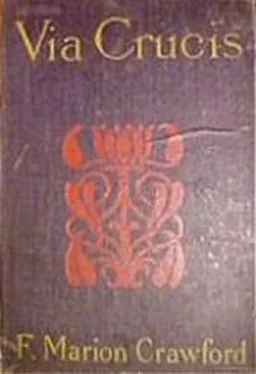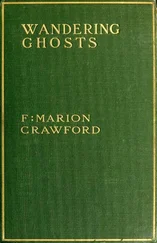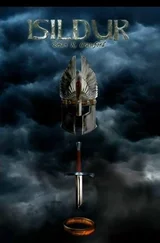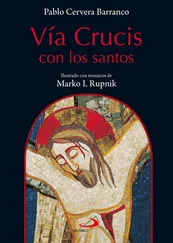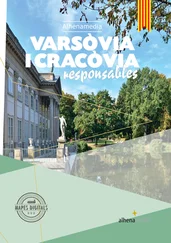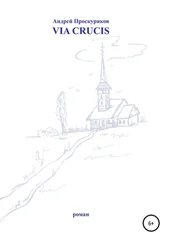F. Crawford - Via Crucis
Здесь есть возможность читать онлайн «F. Crawford - Via Crucis» весь текст электронной книги совершенно бесплатно (целиком полную версию без сокращений). В некоторых случаях можно слушать аудио, скачать через торрент в формате fb2 и присутствует краткое содержание. Жанр: Исторические приключения, на английском языке. Описание произведения, (предисловие) а так же отзывы посетителей доступны на портале библиотеки ЛибКат.
- Название:Via Crucis
- Автор:
- Жанр:
- Год:неизвестен
- ISBN:нет данных
- Рейтинг книги:3 / 5. Голосов: 1
-
Избранное:Добавить в избранное
- Отзывы:
-
Ваша оценка:
- 60
- 1
- 2
- 3
- 4
- 5
Via Crucis: краткое содержание, описание и аннотация
Предлагаем к чтению аннотацию, описание, краткое содержание или предисловие (зависит от того, что написал сам автор книги «Via Crucis»). Если вы не нашли необходимую информацию о книге — напишите в комментариях, мы постараемся отыскать её.
Via Crucis — читать онлайн бесплатно полную книгу (весь текст) целиком
Ниже представлен текст книги, разбитый по страницам. Система сохранения места последней прочитанной страницы, позволяет с удобством читать онлайн бесплатно книгу «Via Crucis», без необходимости каждый раз заново искать на чём Вы остановились. Поставьте закладку, и сможете в любой момент перейти на страницу, на которой закончили чтение.
Интервал:
Закладка:
Among the French, there were many, both of the great lords and of the simple knights, and of poor men-at-arms, who would have counted it mortal sin to take anything from a stranger without payment, who had come for faith's sake, to fight for faith, and who looked for faith's reward. Yet as there can be in logic nothing good excepting by its own comparison with things evil, so in that great pilgrimage of arms the worst followed the best in a greedy throng, as the jackal and the raven cross the desert in the lion's track. And the roads by which they had marched, and the lands wherein they had camped, lay waste as lie the wheat-fields of Palestine in June, when the plague of locusts has eaten its way from east to west.
When they came to a resting-place after many days' march, mud-stained or white with dust, weary and footsore, their horses lame, their mules overladen with the burdens of those that had died by the way, beards half grown, hair unkempt, faces grimy, clothes worn shapeless, they were more like a multitude of barbarians wandering upon the plains of Asia than like nobles of France and high-born Crusaders. At first, when they reached the halting-place by stream or river or lake, there was a struggle for drinking and a strife for the watering of horses and beasts of burden, so that sometimes men and mules were trampled down and hurt, and some were killed; but it mattered little in so great a host, and a spade's depth of earth was ample burial for a man, and if a priest could be found to bless his body on the spot where he lay it was enough, since he had died on the road to Jerusalem; but the jackals and wild dogs followed the march and lay in wait for dead beasts. Then when the first confusion was over, when hunger and thirst were satisfied, the tents were unpacked with their poles, and the sound of the great wooden mallets striking upon the tent-pegs was like the irregular pounding stroke of the fullers' hammers as the water-wheel makes them rise and fall; and though the army had crossed Europe and had encamped in many places, the colours of the tents were bright still, and the pennants floated in streaks of vivid colour against the sky. Soon, when the first work was over and the little villages of red and green and purple and white canvas were built up in their long irregular lines, the smoke of camp-fires rose in curling wreaths, and bag and baggage, pack and parcel, were opened and the contents spread out. As if for some great festival, men and women chose their gayest clothes and richest ornaments, so that when they met again before the open tents which were set up for chapels, one for each little band of fellow— townsmen and neighbours at home, and afterwards when they ate and drank together according to their rank, under wide awnings at noontide, or beneath the clear sky in the cool of the evening, it was a goodly sight, and every man's heart was lightened and his courage returned as he felt that he himself had his share and part of the glorious whole. For it was as it always is and always must be, where power and wealth are masters of the scene, and there is no acting room for misery or sorrow or such poor strolling players as sickness and death. The things which please not the eye are quick to offend souls nursed in a faultless taste, and the charnel-house of failure receives whatsoever things have not the power of pleasing.
Now when they came to Nicaea, hope was high, and the light of victory to come seemed to be shining in every man's eyes. There for the first time Queen Eleanor led out her three hundred ladies in battle array, clad in bright mail, with skirts of silk and cloth of gold, and long white mantles, each with the scarlet cross upon the shoulder; and on their heads they wore light caps of steel ornamented with chiselled gold and silver, and here and there with a metal crest or a bird's wing, beaten out of thin silver plate.
It was at noonday under the fair autumn sun. A broad meadow, green still in patches, where the grass had not been burned brown by the early summer heat, stretched toward the Lake of Ascanius, where the ground rose in hillocks, to end abruptly in a sheer fall of thirty or forty feet to the water's edge. There were places where there was no grass at all, and where the dry gravel lay bare and dusty, yet on the whole it was a fair field for a great assembly of men on horseback and on foot. To southward the meadow rose, rolling away to the distant hills, whither the German host was already gone. The great lords, with their men-at-arms and squires, riding each in the midst of his vassal knights, went out thither to see such a sight as none had seen before, and ranged themselves by ranks around the field, so that there was room for all. And thither Gilbert went also with his man Dunstan, in the King's train, for he owed no service nor allegiance to any man there. But they waited long for the Queen.
She came at last, leading her company and mounted on a beautiful white Arab mare, the gift of the Greek Emperor, as gentle a creature as ever obeyed voice and hand, and as swift as the swiftest of the breed of Nejd. She rode alone, ten lengths before the rest, tall and straight in the saddle as any man, a lance in her right hand, while her left held the bridle low and lightly; and at the very first glance every soldier in that great field knew that there was none like her in the troop. Yet her fair ladies made a good showing and rode not badly as they cantered by, brilliant and changing as a shower of blossoms, with black eyes, and blue, and brown, fair cheeks and dark, and laughing lips not made to talk of rough deeds save to praise them in husband or lover.
Next to the Queen and before the following ranks rode one who bore the standard of Eleanor's ancient house, Saint George and the Dragon, displayed on a white ground and now for the first time quartered in a cross. The Lady Anne of Auch was very dark, and her black hair streamed like a shadow in the air behind her, while her dark eyes looked upward and onward. Splendidly handsome she was, and doubtless Eleanor had chosen her for her beauty to be standard bearer of the troop, well knowing that no living face could be compared with her own, and willing to outshine a rival whose features and form were the honour and boast of the South.
They rode in a sort of order, in squadrons of fifty each, but not in serried ranks, for they had not the skill to keep in line, though they rode well and boldly. And before each squadron rode a lady who for her beauty or her rank, or for both, was captain, and wore upon her steel cap a gilded crest. Each squadron had a colour of its own, scarlet and green and violet, and the tender shade of anemones in spring, and their mantles had been dyed with each hue in the dyeing-vats of Venice, and were lined with delicately tinted silks from the East, brought to the harbours of France by Italian traders. For the merchants of Amalfi filled the Mediterranean with their busy commerce and had quarters of their own in every Eastern city, and had then but lately founded the saintly order of the Knights Hospitallers of Saint John of Jerusalem, whence grew the noble community of the Knights of Malta, which was to live through many centuries even to our day.
Nor could the Queen's ladies have worn mail and steel and wielded sword and lance, so that at a long stone's throw they might almost have passed for men, but that cunning jewellers and artificers of Italy, and Moorish smiths from Spain, had been brought at great pains and cost to France to make such armour and weapons as had never been wrought before. The mail was of finest rings of steel sewn upon soft doeskin, fitted so closely that there was no room for gambison or jerkin; and though it might have stopped a broad arrow or turned the edge of a blade, a sharp dagger could have made a wound beneath it, and against a blow it afforded less protection than a woollen cloak. Many had little rings of gold sewn regularly in the rows of steel ones, that caught the light with a warmer sparkle, and the clasps of their mantles were of chiselled gold and silver. The trappings of each horse were matched in colour with the ladies' mantles, and the captains of the squadrons wore golden spurs.
Читать дальшеИнтервал:
Закладка:
Похожие книги на «Via Crucis»
Представляем Вашему вниманию похожие книги на «Via Crucis» списком для выбора. Мы отобрали схожую по названию и смыслу литературу в надежде предоставить читателям больше вариантов отыскать новые, интересные, ещё непрочитанные произведения.
Обсуждение, отзывы о книге «Via Crucis» и просто собственные мнения читателей. Оставьте ваши комментарии, напишите, что Вы думаете о произведении, его смысле или главных героях. Укажите что конкретно понравилось, а что нет, и почему Вы так считаете.
